Lone Star Overnight is a regional leading parcel delivery company, headquartered in Austin, Texas. They provide overnight, time-definite express package delivery services. It is a regional shipping carrier that focuses on express next-day delivery for both air and ground transportation.
Lone Star Overnight is a well-established delivery service. Being a huge courier service means there is a large number of orders taking place daily, which can sometimes be copious. It’s essential to keep track of all the deliveries and the locations where the product is to be delivered in order to make sure no damage is taking place. Since manual reconciliation does not assure accuracy for a large volume of verification, adapting to automated software will be the optimal choice.
Cointab reconciliation software can easily verify various charges and reports without substantial use of manual effort. Compare reports like ERP reports, Shipping invoices, Pincode master, SKU reports and Rate cards with the invoice provided by Lone Star Overnight. Reconcile all the reports without any chaos and easily check if any discrepancies or miscalculations are present.
Reports Required for Lone Star Overnight delivery Invoice Verification:
Pincode Zone Report:
Pincode zone reports consist of the zone according to the source location and destination location.
SKU Report:
This report consists of a unique number assigned to each product which helps in determining the weight and dimensions of the product.
Rate Card:
The rate card includes different shipping charges, that are charged based on the weight and zone of the order.
Lone Star Overnight Delivery Invoice:
Important columns like order ID, billing zone, product type, weight, RTO, billing pincode, applied weight slab and the amount charges are present in the Lone Star Overnight delivery invoice, in order to make further calculations.
Invoice Verification:
Invoice verification showcases the weight obtained from the SKU report, the zone obtained from the Pincode master and the rates calculated from the rate card. These values are reconciled with the courier invoice in order to make sure your business has not been overcharged.
SKU Report:
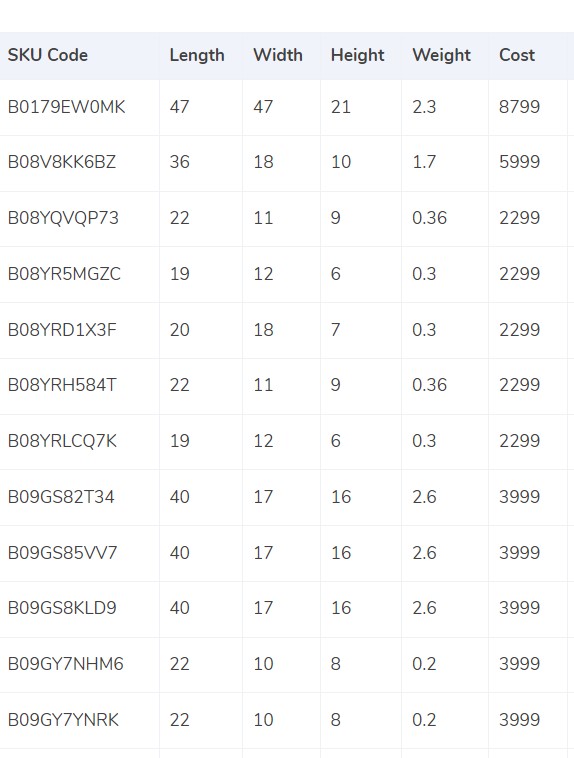
- The software refers to the SKU code present in the ERP report, in order to get the weight and dimension of the product.
- The value present in the weight column of the invoice is taken into consideration, in case the weight is not present in the ERP report.
- If the dimension of the product is given, then the volumetric weight can be calculated using the formula i.e. “Length x Width x Height”.The dimensions of the volumetric weight have to be present in centimetres, in order to make the calculation work.
- The calculated value is later divided by the divisor provided in the divisor card and if the value is not present in the divisor card then it’s by default divided by 5000.
- Later the values are moved to the Lone Star Overnight delivery invoice and ERP report after the calculation is made.
- At last, the final weight is rounded off in order to get the final slab.
Pincode Master:
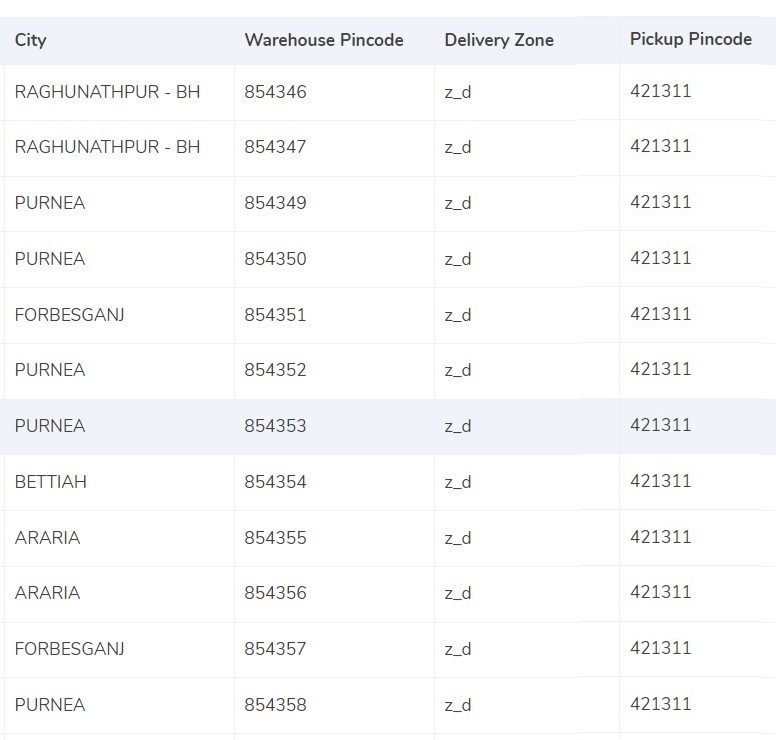
- The report includes the origin location and delivery location and a zone is then assigned to that combination.
- The origin and delivery location are linked to the invoice in order to get the desired zone for each invoice.
- Each and every location is classified either into regional, international, global, etc. and is further classified in their respective indicator i.e. a,b,c, etc.
Rate Card:
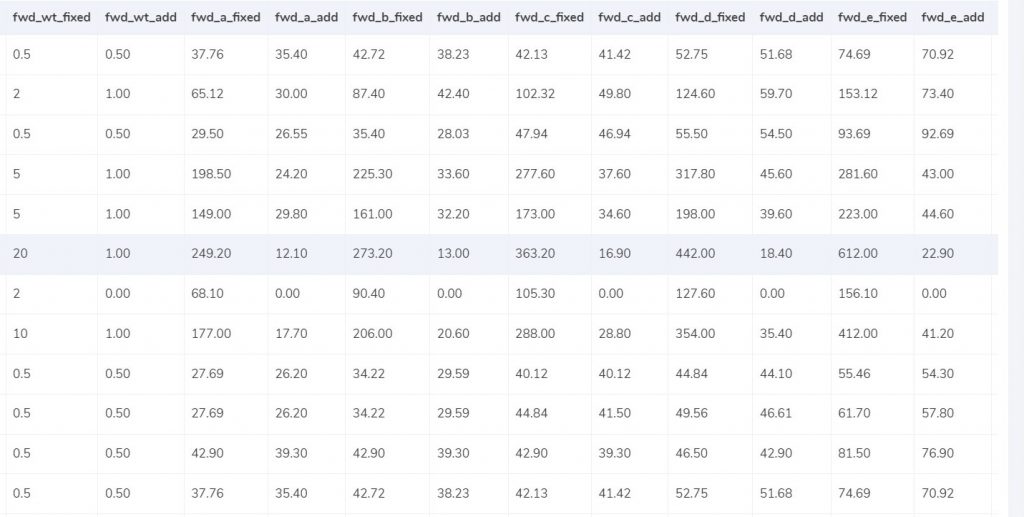
- The rates in the rate card are mentioned according to the zone and weight of the product. The charges might differ if the weight of the product increases, the rates given above are given according to the acceptable limit.
- Columns like “courier”, “zone”, and “fwd_wt_fixed” ( refers to the additional weight on which the fixed rate increases) and the divisor are checked with the respective columns present in the Lone Star Overnight delivery invoice, to verify the right items are put in the invoice.
- The dates of delivery are prescribed under specific rates, as the rates are applicable for a certain period of time.
Charges:
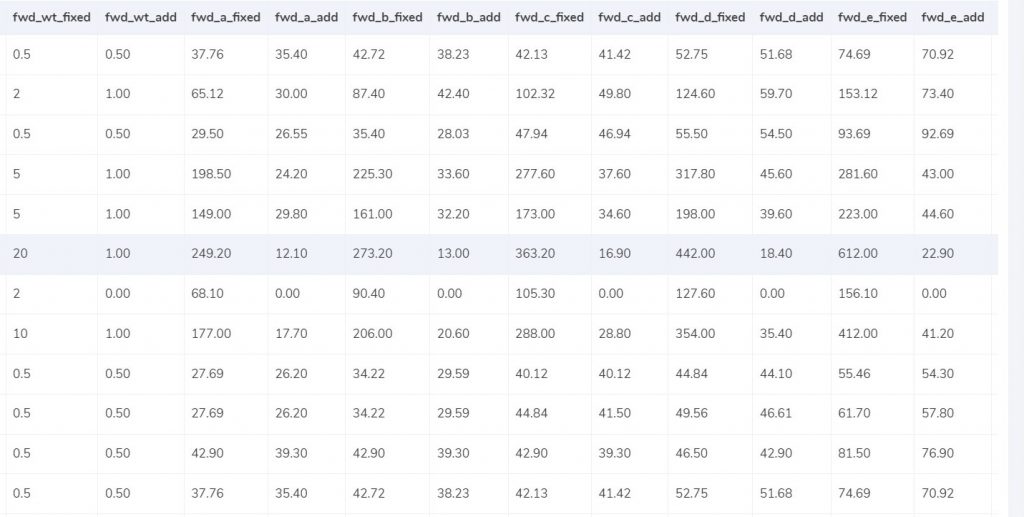
Expected Forward Charge:
After the final slab is calculated if it is seen to be lower or equal to the weight limit (“fwd_wt_fixed”) given in the rate card, that means it is equal to “fwd_wt_fixed”. Then the fees charged on it are “fwd_fixed” according to the zone. If the product is not equal to “fwd_wt_fixed” then it means that the product has more weight. The fee charged for extra weight is “fwd_add” according to the zone.
The formula for the expected rate is:
Expected_fwd_chg = fwd_fixed + (extra_weight) x fwd_add
Expected RTO Charge:
After the final slab is calculated if it is seen to be lesser or equal to the weight limit (rto_wt_fixed”) given in the rate card, that means that it is equal to the “rto_fixed” and the fee charged on it is “rto_fixed” according to the zone. If it is not equal to the “rto_wt_fixed” column then that means that the product has extra weight. The fee charged for the excess weight is “rto_add” as per the zone.
The formula for the expected charge is as seen below
Expected_rto_chg = rto_fixed + (extra_weight) x rto_add
Expected Final Amount:
The expected final amount is calculated using Forward charge, RTO charge and tax %.
Result:
Cointab Reconciliation software uses the expected value which is obtained from the ERP report, Pincode master and rate card. The expected value is later calculated in order to get the expected fee, which is reconciled with the Lone Star Overnight invoice, in order to make sure you have not been overcharged.
ERP:

Found in ERP:
The number of products delivered for a particular order is present in the ERP report. In the above case, the orders present in the Lone Star Overnight delivery invoice are also found in the ERP report, which helps to denote the weight of the product which can be later verified.
Not Found in ERP:
In the above case, the orders present in the Lone Star Overnight delivery invoice are not present in the ERP report and hence the orders cannot be verified further.
Pincode Master:

Found in Pincode Master:
The data entries are present in the Lone Star Overnight delivery invoice as well as in the rate card and hence the order can be verified further.
Not Found in Pincode Master:
The data entries are present in the Lone Star Overnight delivery invoice but are not present in the rate card and hence they cannot be verified further.
Rate card:

Found in Rate card:
The order entries are found in the invoice of Lone Star Overnight as well on the rate card, so the records can be further verified.
Not found in Rate card:
The order entries are found in the invoice of Lone Star Overnight but are not present in the rate card and hence cannot be verified further.
Fee Verification using ERP- Lone Star Overnight Delivery
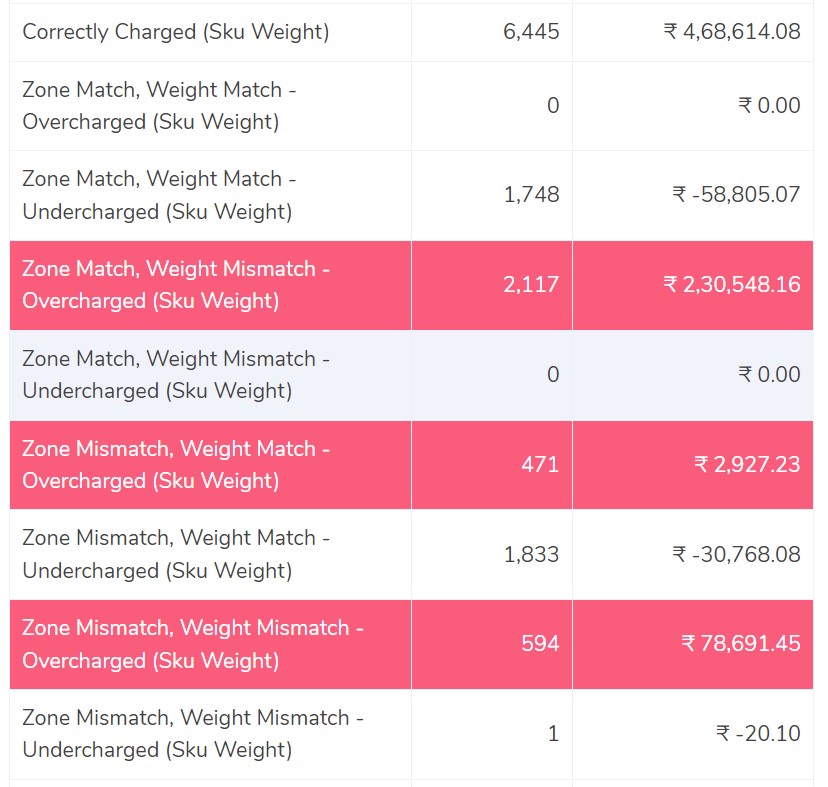
Correctly Charged:
The fee calculated with the help of the rate card matches the fee present in the Lone Star Overnight delivery invoice. The software compares the ERP report and the Lone Star Overnight delivery invoice report and shows the order deliveries where the zone and the weight of the product are correct.
Zone Match, Weight Match- Overcharged:
Here, the software compares the ERP report and Lone Star Overnight delivery report, which shows that the zone and weight of the product match but the fee charged is wrong. In this situation, the invoice charges are seen to be more compared to the calculated amount, hence it is seen to be overcharged.
Zone Match, Weight Match- Undercharged:
The software compares the ERP report and Lone Star Overnight delivery report, which shows that the zone and weight of the product match but the fee charged is wrong. In comparison to the calculated amount the invoice charges are seen to be less, hence it is said to be undercharged.
Zone Mismatch, Weight Match- Overercharged
When the software compares the ERP report and Lone Star Overnight delivery report it’s seen that the zone of the product and fees are not match except for the weight. Since the zone of the product does not match, the amount is seen to be overcharged compared to the calculated amount.
Zone Mismatch, Weight Match- Undercharged:
The software compares the ERP report and the Lone Star Overnight delivery report and it’s seen that the zone and fees of the product do not match, but the weight matches. Since the fees and zone do not match it is seen to be undercharged compared to the calculated amount.
Zone Match, Weight Mismatch- Overcharged
Here, the software compares the ERP report and the Lone Star Overnight delivery report and it is observed that the weight and the fees of the product do not match in both reports, only the zone matches. Hence the amount is overcharged in this case.
Zone Match, Weight Mismatch- Undercharged:
The software compares the ERP report and the Lone Star Overnight delivery report and it’s seen that the zone and fees of the product match, but the weight of the product does not match. Since the weight is seen to be mismatched it is seen to be undercharged compared to the calculated amount.
Zone Mismatch, Weight Mismatch- Overcharged
The software compares the ERP report and the Lone Star Overnight delivery report showing that the zone, fee and weight do not match. The amount is seen to be more than the calculated amount.
Zone Mismatch, Weight Mismatch- Undercharged
The software compares the ERP report and the Lone Star Overnight delivery report it shows that the zone, fee and weight of the product do not match. Hence the amount is seen to be less than the calculated amount.
Cointab reconciliation software offers seamless integration, where you can easily import your data and create a tailored workflow that aligns with your specific business needs. Get comprehensive 360-degree insights on the disparities that are present and identify them with ease. What are you waiting for, free yourself from laborious manual reconciliation and start using Cointab Reconciliation software, for a better tomorrow in your reconciliation journey.



